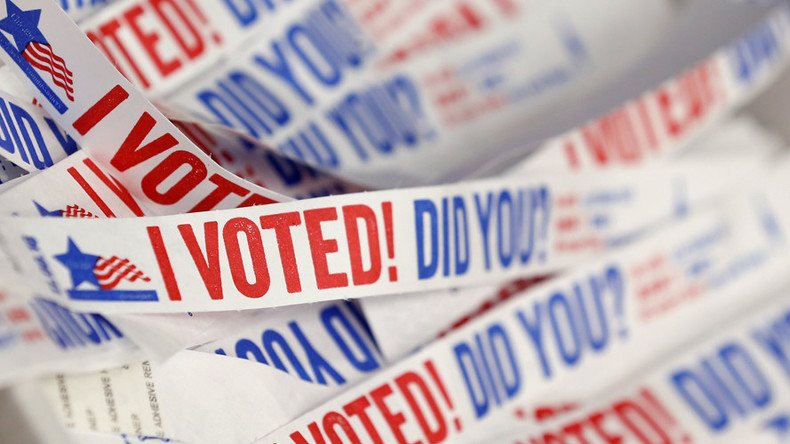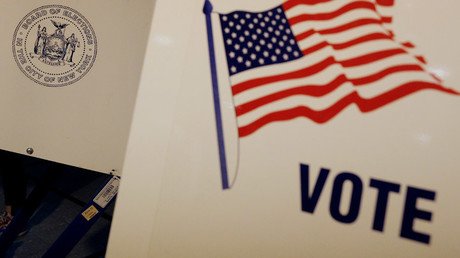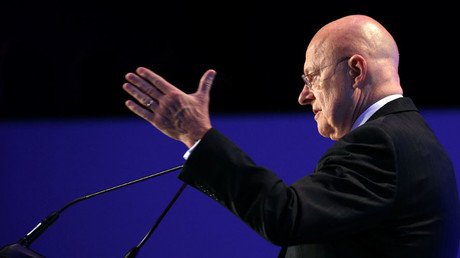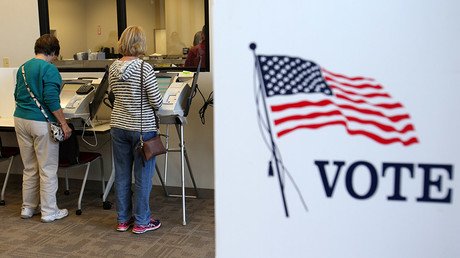They can't rig elections, but they can fake it – US officials alter approach on ‘Russian hackers’

While agreeing with President Barack Obama that the US election system is too big to hack, officials in his administration are now suggested that any evidence of voting impropriety may be a plot by “Russian hackers” to undermine democracy in America.
Hackers supposedly tied to Russian intelligence could try to “undermine the credibility of the presidential election by posting documents online purporting to show evidence of voter fraud,” Reuters reported Thursday, citing “intelligence and law enforcement officials” who requested anonymity.
Echoing the comments made by President Barack Obama, the officials said the US system is so “large, diffuse and antiquated” that altering the November 8 vote would be practically impossible. However, hackers could post documents, “some of which might be falsified, designed to create public perceptions of widespread voter fraud,” the officials said, according to Reuters.
‘Americans should fear election hacking by US establishment, not Russia’ (Op-Edge by Annie Machon) https://t.co/QcZAFSAvD4
— RT (@RT_com) October 17, 2016
The anonymous officials admitted they “did not have specific evidence of such a plan,” but that state and local election authorities have been warned to be vigilant.
Democratic National Committee officials and Hillary Clinton’s campaign have accused Russia of being behind the disclosures of their emails and documents, while also denying their authenticity, since the first batch of DNC emails was made public in June by a hacker calling himself “Guccifer 2.0.”
Indications of collusion against Bernie Sanders between the Clinton campaign and the DNC during the primaries have prompted Republican nominee Donald Trump to speculate the general election might suffer from similar improprieties. The Democrats have countered by accusing Trump of being a “puppet” of Russian President Vladimir Putin.
Cybersecurity experts cited in US news outlets cannot seem to decide whether the purported Russian hackers are fearsome or grossly incompetent. One former UK cyberspy claimed that some of the files were modified by a person with the username “Feliks Dzerzhinsky” – founder of the Cheka, the first Soviet secret police. Another company, called SecureWorks, has said that the hackers who broke into the emails of Clinton campaign chairman John Podesta through a phishing link “forgot” to toggle the privacy setting on their account, leaving their trail visible to all.
On October 7, the Department of Homeland Security and Director of National Intelligence claimed that Guccifer 2.0, the whistleblower site DCLeaks and even WikiLeaks were all part of “Russian-directed efforts… intended to interfere with the US election process.”
“We believe, based on the scope and sensitivity of these efforts, that only Russia's senior-most officials could have authorized these activities,” said the statement, posted by the Director of National Intelligence James Clapper.
Putin: White House uses #Russia scaremongering to manipulate Americans https://t.co/okm80mTERqpic.twitter.com/0CtvF7n5YE
— RT America (@RT_America) October 12, 2016
On Tuesday, President Barack Obama said that Trump should “stop whining” about the possibility of election fraud, adding: “There is no evidence that that has happened in the past, or that there are instances that that can happen this time.”
“There is no serious person out there who would suggest somehow that you could even rig America’s elections,” Obama said.
Just in case, however, anonymous administration officials are now telling the press that any proof of fraud would itself constitute “Russian” interference.
Russia wants 2 monitor the U.S. presidential elections•They have hacked info frm many countries•This Will NOT happen https://t.co/BYKRskCBcT
— Amy (@flwrpwr1969) October 21, 2016
Russia’s request to send election observers to several US states has been rejected this week, and the State Department called it a “public relations stunt.” US officials told Moscow its observers could come as part of the OSCE’s Office for Democratic Institutions and Human Rights (ODIHR) international mission.
The matter of allowing or rejecting Russian observers was entirely up to the individual US states, State Department spokesman John Kirby told reporters Friday. Though the Russians have shown “proclivity to sow discord and lack of confidence in our system,” according to Kirby, the federal government was “confident” in the electoral process.
Some 63 US observers were among the 774 monitors from 63 countries that were accredited to observe the Russian parliamentary elections in September.
















